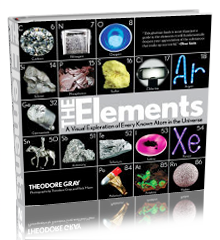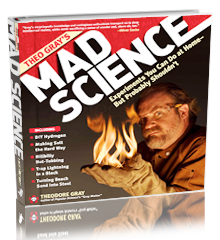Lanthanum Boride.
From the source:This is a very old (relatively) research sample of lanthanum hexaboride. If that chemical name means anything to you, then you likely belong to the 0.01% of the living human population that has been privileged enough to have experience in the realm of electron microscopy, or possibly some other advanced technology involvingthe precise blasting of electrons.
The one and only industrial use for this compound (and the reason for this sample's existence) is as a cathode for emitting electrons into some sort of very expensive piece of equipment. Lanthanum hexaboride happens to have a very small "work function," which is basically a quantitative measure of how much energy it takes for the material to spontaneously spit out an electron. Low work function, more electrons per quanta of energy! It gets much more complicated and less fun (math math math) the more questions one asks, so we'll leave it at that.
So, nowadays, very small (around the size of a grain of sand) perfect single crystals of LaB6 are grown to be used as the most common filament in modern electron microscopes. When I say perfect, I mean that the surfaces of the crystal are not far off from being atomically flat. This is not actually accomplished through the growing process, but rather the post-growth treatment and "polishing." Other cathode materials can be used for various reasons (tungsten metal is still common), but lanthanum hexaboride is widely regarded as the best performing and most reliable. Which neatly segues to this sample: one glance tells us that this is not a single crystal, and it is actually a good-sized chunk. This piece dates from approximately 40 years ago, when lanthanum hexaboride was just discovered as an interesting material. I'm not quite sure which particular property was being investigated with this sample, but all of the compound's electronic properties were measured exhaustively--conductivity, Hall effect, and then that nifty work function. The large white patches and holes in the corners are an artifact of this battery of tests--wires were wrapped around the material through the holes, and an epoxy filled with tiny silver particles was applied to cement these measurement wires in place and guarantee a good electrical connection (so this is actually two element samples in one!). As for the wavy surface texture in the back, I'm not sure- certainly it ended up like that from whatever method was used to fabricate this small block of the material, but I'm not sure what might cause that particular appearance. Bathe in the purple glory of this beautiful and interesting compound that was completely unknown to science when your parents were in school (almost no matter who you are).
Source: Ethan Currens
Contributor: Ethan Currens
Acquired: 14 October, 2008
Text Updated: 1 March, 2009
Price: Donated
Size: 1"
Composition: LaB6
|

